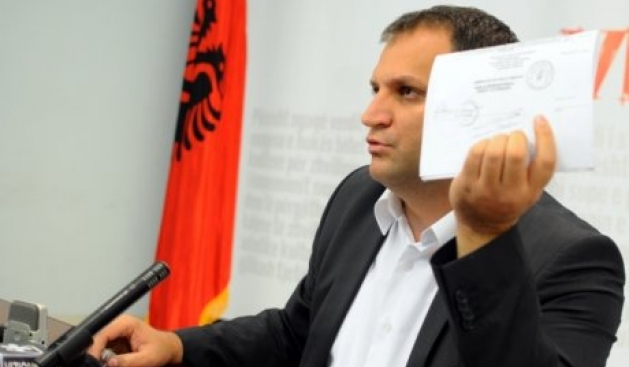Tuesday, December 10th 2013

Shpend Ahmeti has a vision of a city that works better and treats its people more fairly – but can he deliver?
In the lobby of headquarters of Levizija Vetevendosje!, photographs plastered over on one of the walls cover the various protests they have held over the years.
These demonstrations have punctuated the party’s image, calling to mind the exclamation mark affixed to its name, which means “Self-Determination Movement!”
Opposition, to the UN mission in Kosovo, to “supervised” independence, and lately to agreements with Serbia, has long defined Vetevendosje, from its early days as a movement in the 2000s to the bona fide party that it is today with seats in parliament.
But, in a few weeks, once Vetevendosje’s Shpend Ahmeti is sworn in as mayor of Prishtina, the party will have real power for the first time. It is both a challenge and an opportunity ahead of next year’s national elections.
“Visible changes have to be seen in the first months, for people to see how Vetevendosje governs, because this is a real test,” Ahmeti, a soon-to-be former lecturer at the American University of Kosovo, says.
Ahmeti staked his campaign on good governance and on offering nuts-and-bolts solutions to Prishtina’s manifold problems.
Back in 2010, at a time when government in Kosovo was deadlocked and hit by scandal, he co-founded the Fryma e Re, or New Spirit Party.
Its leaders were young and often Western educated, as was Ahmeti, who had studied public administration at Harvard. They, too, campaigned on a platform of good governance while generating plenty of buzz in Kosovo and abroad.
But the party flopped at the polls, failing to meet the 5-per-cent threshold needed to enter parliament in the 2010 elections.
In 2011, a battered New Spirit merged with, or perhaps more accurately, was absorbed by, Vetevendosje. The move rankled with some New Spirit supporters and leaders, who felt betrayed by the union and disliked Vetevendosje’s firebrand leader, Albin Kurti.
Three years later, the move has paid off handsomely for Ahmeti, now 35, however. While Ahmeti has held the party line as its vice-president, he says he has not changed his “centre-left” views, nurtured as a graduate student at Harvard’s Kennedy School.
“I’m still fighting for equality, social change and progressive thought. These are the key things I believe in. This is the part of Vetevendosje where I fit in best, with these policies,” Ahmeti says.
During the single debate that Isa Mustafa agreed to in the campaign, ahead of the run-off, very different philosophies emerged between the incumbent mayor and Ahmeti when it came to social welfare.
During an exchange about the unpaid employees of the municipal bus company, Mustafa insisted that the problem was not the municipality’s responsibility, whereas Ahmeti contended that the municipality had an obligation to step in and help.
“When you see a family with children, and their electricity is cut off because they have no money, and they send their children to school with no food, those for me are the biggest problems that this city has,” he says. “I am a little bit overwhelmed with the sheer magnitude of the issue,” he adds.
Ahmeti sees local government as something that should be active, helpful and service-oriented. “The policies in place until now have made people very private in their own apartments,” he says.
Changes in the governance of the city will begin from day one, with improvements to communication and transparency, Ahmeti says. That promise seems credible, as Vetevendosje is the most financially transparent and publicly accessible political party in Kosovo.
Ahmeti admits that providing Prishtina with water for 24 hours day within 24 months will be among his toughest challenges.
“This is an issue that it touches the whole of Prishtina. More than 60 per cent of people face water restrictions, 20 per cent for up to 12 hours per day; that’s ridiculous in 2013,” he says.
Just about every candidate for mayor promised to deliver 24-hour water. A project is also underway largely with German funding, and support from the Kosovo government and municipality of Prishtina, to build a new water plant that will be in service by 2017.
But Ahmeti says the project isn’t enough. He says the real issue is that too much water is being wasted, both through legitimate connections and losses in the system.
“We need to reduce water consumption from 140 liters to 125 per day per person, that’s one challenge, and secondly we have to find out where the water is going, which is easily doable,” he says.
Within a year, Ahmeti says a proper public transport system will also be in place with new buses and new lines. Changes in traffic and parking will follow.
“Cars are not our priority, people are,” Ahmeti says. “Once we fix our public transport then we get into restrictive policies about cars in the city centre. It should be more expensive to get here [by car]. People should find it cheaper and better to use public transport.”
Ultimately, the success of Ahmeti’s plans will come down to resources and execution. The Democratic League of Kosovo, LDK, has controlled Prishtina for the past 14 years. Its influence extends into the ranks of the civil service, which will have to execute Ahmeti’s policies.
But Ahmeti feels confident that he can transform Prishtina’s municipal machine.
“We will see where the obstacles lie; I think a lot of the problems were in management – cronyism – but we’ll deal with that once we see what we have in hand, in terms of who works where and what terms of reference they have and how did they deliver.”
There will be zero-tolerance of corruption, Ahmeti says, while attempts will be made to remedy performance and competence issues through training.
Another personnel problem lies in the city assembly, where Vetevendosje holds only 10 of the 51 seats. The LDK has lost its majority, but still has the largest number of seats.
Having apparently learned the art of political spin, Ahmeti paints his party’s small presence in the assembly in a positive light. “It’s good that we don’t control the municipal assembly… it’s good for democracy,” he says.
The mayor-elect warns that while coalitions are out of the question, he will work with anyone who is not under investigation for corruption. “Then we have nothing to talk about,” he says.
Ahmeti also faces the challenge of Prishtina itself. Mass construction of both legal and illegal builds has eaten away at remaining green space and blighted the city with notorious landmarks. Ahmeti pledges to snuff out illegal construction but is realistic about the damage that has been done.
“The time has come to save whatever we can save,” he says.
“I’m not saying we’re going to achieve miracles in the way that Prishtina looks. But we should go into some long-term planning and deal with some short-term problems,” he concludes.
This interview were published firstly on 09 DEC 13 in balkaninsight.com
Nate Tabak BIRN Pristina




